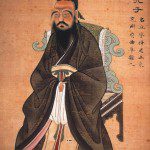If you want to see an example of good contextualization, read Gregg Ten Elshof’s Confucius for Christians: What an Ancient Worldview Can Teach Us about Life in Christ (Eerdmans, 2015). It’s short, practical, and very substantial.
A book like this could be polarizing. So, let’s begin by clarifying what Ten Elshof does and does not do. Otherwise, we might misread him (as at least one reviewer has done). He does not:
- attempt to “reconcile” or “harmonize” Confucianism and Christianity
- treat Confucius or Analects as authoritative comparable to the Bible
- develop a systematic theology of any sort (whether of the church, Christ, salvation, etc.)
- confuse general revelation and special revelation
By contrast, what does he attempt to do in his book?
In short, Ten Elshof explores how interacting with Confucianism can help us regain many important biblical insights, which are often overlooked in Western traditions.
“Confucian Christianity?”
Ten Elshof begins, “most Christians in the West — insofar as their thinking is informed by the Western philosophical tradition — are Platonic Christians whether they’ve heard of Plato or not” (4). He, therefore, ponders what “Confucian Christianity” might look like. In other words, just as Western philosophy has influenced the church’s theology and practice, how might understanding Confucianism expose blind spots and so help us become better disciples of Christ?
The book focuses on 4 main areas: family, learning, ethics, and ritual. I will highlight a few of my favorite points, though you will want to see his full discussion in the book.
FAMILY
Ten Elshof says that Confucian thinking challenges the basic penchant many people have towards individualism. How might a more collectivistic orientation shape us as disciples? Ten Elshof says, “for the Confucian, the better you love your family, the more capable and effective will be your love for those beyond your family” (19–20).
This insight no doubt reflects a basic assumption of Scripture. The family is a fundamental paradigm for explaining how God’s people relate to one another throughout the world. Yet, Ten Elshof notes,
“We’re tempted to think that we can somehow manage to love the world without having learned to love well those whom have been given to us as family” (19).
This is a significant reminder for many who have grown up in disconnected families and sought “freedom” from these relationships. Our perspective on and practice of family life either grounds or undermines our progress as disciples.
LEARNING
“To be learning is to be in process” (31).
This thought catalyzes his discussion about what it means existentially to be human. He does not develop a “doctrine of humanity.” Ten Elshof challenges the habit of mind that sees knowledge itself as power. This mindset regards the mastering of information as the key to autonomy and achieving our ambitions.

He laments the fact that people do not value learning as they should. Confucius saw learning as an essential aspect of character development. What happens is we treat learning as a mere tool for social power and status (after which one can stop learning)? We forsake a basic component of what it means to be human. In particular, Ten Elshof says, we cease living as followers as God designed.
In short, maturity, following, and learning stand in contrast to closed-minded orthodoxy that posits theological algorithms for Christian living.
ETHICS
Ten Elshof points out the tendency among Christians to extract ethical principles from Scripture that might then be applied to everyone in any circumstance. Yet, according to Confucian thinking, some problems can arise in approaching ethics in this way.
For instance, Ten Elshof summarizes,
“The response of the good person, then, will depend both upon the well-formed character of her heart and upon the relational specifics of her particular situation” (50).
Jesus’ teaching itself must be understood in its own context as addressing the people and circumstances around him. One’s ultimate obligation is always to God, but that allegiance will be expressed differently in different relational contexts.
Ten Elshof, in essence, reminds readers that Christian discipleship is about following the example or pattern of Christ rather than “[extracting] a collection of principles from the scriptures [which does] not guarantee that one will actually love one’s enemies.”
Why? Because “there is little if any correlation in Christian circles between expertise in the scriptures and actual ability to love one’s enemies.” (62)
RITUAL
Finally, Ten Elshof should be applauded for addressing the topic of ritual, which some church circles instinctively frowned at. However, rituals are simply (or at least) those routine practices or habits that shape our moral thinking. We all have rituals, whether or not we use the word “ritual.”
Drawing on Confucius, Ten Elshof writes,
…because of his insistence on both spontaneity and the need for training, ethical theory in the wake of Confucius occupied itself largely with the discovery of practices that would shape a person in such a way that goodness would be their natural disposition. (70)
In other words, rituals can develop “trained spontaneity” necessary for making wise and ethical decisions amid the “chaos of life” (72, 76).
Is this not what we see throughout the Bible? Israel’s celebrations and customs served as reminders of the holiness of God, whom their lives were to reflect. Consistent prayer and regular meetings of the church are similarly used rituals in the New Testament.
Put simply, Ten Elshof’s Confucius for Christians is a fantastic contribution to the church. It is a practical, humble and courageous approach to contextualization, a subject that can intimidate (and even worry) some people. Whether one is interested in theology, contextualization, or Eastern thinking, I certainly recommend this book.
(Click here to see my previous post where I correct possible misunderstandings of Elshof’s book)














